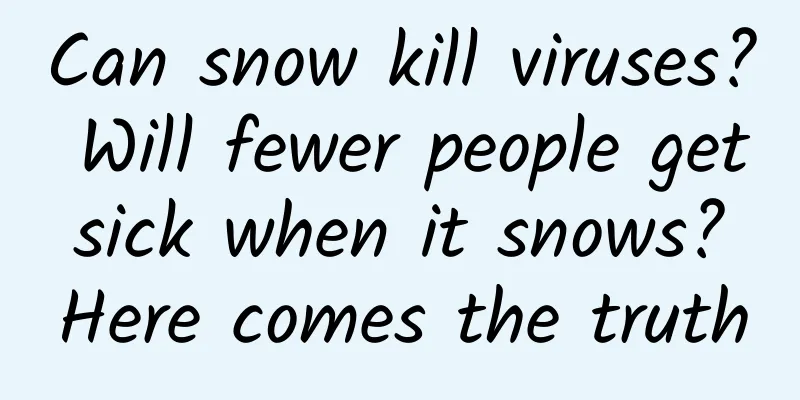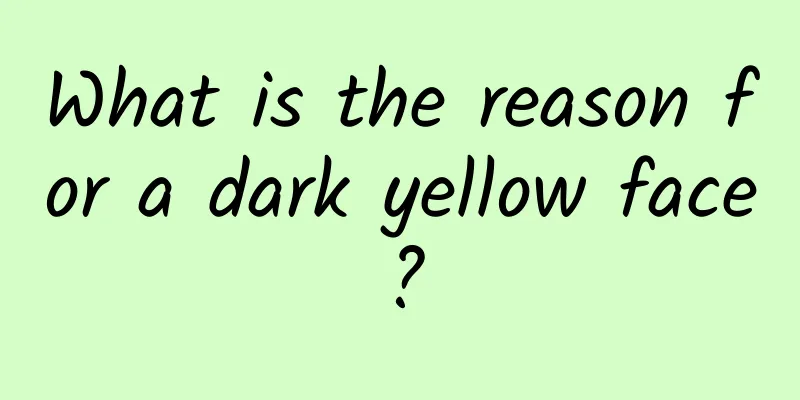Can snow kill viruses? Will fewer people get sick when it snows? Here comes the truth

|
It snowed in many cities in the north today! Recently, people have been troubled by various upper respiratory tract infections. Some sayings have been mentioned again: when it snows or rains, people get sick less. Is this saying really reliable? Let's talk about it in detail today. Photo by: Gong Aobo Effects of weather and climate on the transmission of respiratory viruses There are many pathogens that are prevalent in the fall and winter, but the most thoroughly studied one is probably the influenza virus. Snow is a weather condition, but in fact, when it snows, the temperature drops and the humidity changes. There are many studies that study these different parameters and the impact of weather and subsequent transmission of influenza viruses. First of all, the drop in temperature is definitely the most significant change. Cold weather may make the flu virus more stable, just like frozen food can be kept longer in the refrigerator. Also, when the weather gets colder, the blood flow in our nose will decrease, the secretions in the nasal cavity will be less, and the ability of nasal hair to clean the dirt in the nose will also be worse. This means that the virus is more likely to "settle down" in our upper respiratory tract. Image source: pixabay An important reason why we look forward to snow is that when it snows, we usually feel that the air is cleaner and fresher, and there is less suspended dust in the air. But in fact, the relationship between suspended droplets in the air and the survival of viruses is not just as simple as "sedimentation reduces viruses". Although the particles are large and we may see less dust with our naked eyes, studies have shown that those suspended particles that are not visible to the naked eye are the important factors affecting the spread of the virus. Large particles will settle quickly, but they will not fall directly to the ground, but will be suspended in the space at a certain height above the ground, which will expose people near the infected person for a longer time; on the other hand, if the suspended particles in the air are relatively small, the virus may float to a higher horizontal position and spread over a longer distance through air flow. Nasal immune mechanism proves that cold increases the probability of infection Harvard Medical School recently published a new study on nasal immune mechanisms, which found that cold weather actually makes us more susceptible to upper respiratory tract infections. Why upper respiratory tract infections are more common in cold temperatures Research has shown that when pathogens enter the human body through the nose, they trigger a special defense mechanism in the nasal cavity. This mechanism is like the little guards in our noses. When they find pathogens invading, they quickly release a special tiny bubble (called an extracellular vesicle), which surrounds and attacks the bacteria. It's like when something bad enters our nose, these bubbles are like angry wasps, besieging the invaders. The researchers also found that these bubbles not only directly attack pathogens, they can also transport some special antibacterial proteins from the front of the nose to the back. When viruses or bacteria slip through the bubble net, they can use these proteins for a second layer of protection. However, when the ambient temperature drops and the temperature in the nose decreases, this protective mechanism weakens, and the number of bubbles and antiviral ability decrease. This explains why we are more susceptible to respiratory infections in winter. Determining the causal relationship between environment and disease Is the reduction in disease the reason for the snow? Thinking about this is like thinking that the arrival of night is not the reason why people sleep. Nightfall is certainly not a reason for people to sleep, it's just that most people choose to sleep at night. Snowfall itself does not directly reduce the occurrence of diseases, but people may choose to stay indoors because of snow, thereby reducing contact with others and the frequency of going out, which may indirectly affect the spread of the virus. However, this does not mean that snow itself has the magic to reduce diseases, just as night does not have the magic to make people fall asleep. There's only one way snow can reduce disease spread We just talked about the virus and human immune function, respectively, that snow or temperature drop may not directly improve the chance of respiratory infection transmission. If snow can really reduce the spread of disease, there may be only one way, that is, some people stay indoors and do not contact outsiders because of snow. If it is a blizzard or severe cold, the bad weather will make people stay at home more and cut off all social life, such as not going to work, school, shopping, or going out for a walk. Reducing contact with the outside world will naturally reduce the risk of disease transmission. However, the fact may be just the opposite. We will not change our lifestyles because of a light or moderate snowfall. Instead, we will increase the time spent in closed indoor spaces due to the inconvenience of outdoor activities. For example, we may play chess in a teahouse instead of strolling in the park. This situation will increase the chances of the virus staying and spreading. More importantly, in snowy and cold weather, people tend to ignore the importance of opening windows for ventilation, which further increases the risk of virus transmission in indoor spaces. Obviously, the simplified logic of simply hoping to reduce the incidence of disease through "cleaner air" is not entirely accurate. To live a normal and healthy life We are all familiar with the methods to prevent the spread of respiratory diseases. They are old-fashioned, but effective. Image source: pixabay Wash your hands frequently: Wash your hands with soap and water for at least 20 seconds, especially after visiting public places, before and after eating, before touching your face, and after going to the toilet; Wearing a mask: Wearing a mask in crowded places will leave an extra layer of "nose hair"; Immunization: Have you gotten the flu vaccine this year? The author got the whole family vaccinated in September. Have the elderly gotten the pneumonia vaccine? Have the children received the vaccines they should have on time? Don't change your life routine because of bad weather. A balanced diet, moderate exercise and adequate sleep are the keys to maintaining the normal functioning of our immune system. References [1]DavisRE,RossierCE,EnfieldKB.The impact of weatheroninfluenzaandpneumoniamortalityinNewYorkCity,1975-2002:aretrospe activestudy.PLoSOne.2012;7(3):e34091.doi:10.1371/journal.pone.0034091.Epub2012Mar28.PMID:22470518;PMCID:PMC3314701. [2] LowenAC,MubarkaS,SteelJ,PaleseP.Influenzavirustransmissionisdependentonrelativehumidityandtemperature.Pathogens.2007;3:1470–1476. [3]ShamanJ,KohnM.Absolutehumiditymodulatesinfluenzasurvival,transmission,andseasonality.ProcNatAcadSci.2009;106:3645–3646. [4] ShamanJ,PitzerVE,ViboudC,GrenfellT,LipsitchM.AbsolutehumidityandtheseasonalonsetofinfluenzainthecontinentalUnitedStates.PLoSBiol.2010. [5]LofgrenE,FeffermanN,NaumovYN,GorskiJ,NaumovaEN.Influenzaseasonality:Underlying causes and modelingtheories.JVirology.2007;81:5429–5436. [6]https://hms.harvard.edu/news/why-upper-respiratory-infections-are-more-common-colder-temperatures This article is a work of Science Popularization China-Starry Sky Project Produced by: Science Popularization Department of China Association for Science and Technology Producer|China Science and Technology Press Co., Ltd., Beijing Zhongke Xinghe Culture Media Co., Ltd. Author: Chen Mo'ao, Master of Epidemiology and Health Statistics Review丨Zhang Yu, Researcher, Chinese Center for Disease Control and Prevention, Doctor of Medicine |
<<: Night Listening | How to eat staple foods and control sugar intake?
Recommend
What is the problem when women can’t hold their urine when they feel the urge?
Inability to urinate is a very common phenomenon ...
Don’t panic if your child has eye disease: Intense pulsed light therapy has a magic formula
Author: Han Shumei Shenzhen Children's Hospit...
What causes women's night sweats?
Nowadays, many female friends often suffer from n...
38 weeks biparietal diameter 94 head big?
The baby's biparietal diameter refers to the ...
Pregnancy week one abdominal pain like menstruation
During pregnancy, the human body will undergo man...
What are some ways to slim down your calves? Is it safe to inject botulinum toxin?
Author: Fan Jincai, Chief Physician, Plastic Surg...
Fasting <7, post-meal <10? Wrong! Doctors reveal the 6 key points and 3 cores behind individualized and precise sugar control
Many diabetic patients know that there is a "...
Gynecological adenitis
Adenitis is a relatively common gynecological dis...
I always want to pee but only a little each time. Why?
Frequent urination but small amount is a very com...
What are the methods of making cocktails? What can be mixed with cocktails?
Cocktail is the transliteration of Cocktail. It i...
What precautions should be taken when eating crabs and bananas together? Can I eat bananas and yogurt after eating persimmons?
Bananas are rich in carotene, vitamins, and a lar...
How to check whether the fallopian tubes are blocked?
If you want to know whether the fallopian tubes a...
Can pregnant women drink brown sugar during the confinement period?
Maternal brown sugar can be drunk during confinem...
Not just lung cancer! Why is it so hard to quit smoking?
Have you ever had such an experience? I finally w...
Nipple pain like needles
There are many reasons why nipples feel like they...









